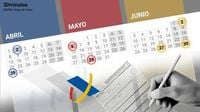The tax campaign for the fiscal year 2024 officially kicks off on April 2, 2025, allowing taxpayers to file their IRPF (Income Tax) returns through various methods until June 30, 2025. This year, the process can be completed online, by phone, or in person at tax offices. While many taxpayers rely on the draft provided by the Tax Agency, it’s crucial to understand that this draft is not a complete declaration but rather a proposal based on the data the agency has. Therefore, it’s essential to review the draft carefully to ensure all information is accurate before submission.
Taxpayers must be aware that if there have been any changes in their family situation compared to the previous year, these must be indicated in the declaration, as the agency does not reflect such changes in the draft. For instance, if a taxpayer got married or had a child in early 2025, they must still declare themselves as single for the 2024 tax year. The Tax Agency will consider the taxpayer's situation as of December 31, 2024, not any changes that occur in the early months of 2025.
One key aspect taxpayers should review is the inclusion of union membership fees, which can be deducted as expenses. However, the Tax Agency usually does not include these fees in the draft. Taxpayers need to manually enter these payments in box 0014 of their 2024 tax return. If membership is necessary for their profession, they can include up to 500 euros annually as deductible expenses. If these fees are not included in the draft, they should be added manually in box 0015.
Homeowners renting out their properties are also required to declare the income received from these leases, which typically does not appear in the draft. They must enter this information manually in their declaration. Moreover, they can deduct necessary expenses related to obtaining this income, such as property depreciation, which the Tax Agency may not have on file.
When it comes to pension contributions, both employer and personal contributions to pension plans are usually reflected correctly in the draft. However, contributions made to a spouse's pension plan may not be accurately represented. Taxpayers need to ensure that these contributions are recorded correctly in box 0465 of the spouse's plan and adjust them in box 0428 of their own declaration.
It's also important to note that the deduction for home purchases applies only if the house was bought before January 1, 2013, and the deduction was claimed in tax returns from 2012 or earlier. Taxpayers with mortgages can deduct premiums for insurance linked to this financing, provided they are included in the mortgage agreement. This information must be manually entered in boxes 0547 and 0548 of the declaration.
For many, the obligation to file a tax return is determined by their income level. Generally, if a taxpayer earns less than 22,000 euros from a single employer, they are exempt from filing. However, if they have multiple employers, they must ensure that the total income from the second and subsequent employers does not exceed 1,500 euros; otherwise, the threshold for exemption drops to 15,876 euros.
Income from capital activities, such as dividends and interest, mandates filing if it exceeds 1,600 euros annually. Similarly, real estate income does not require a declaration if it is below 1,000 euros. Certain groups, including beneficiaries of the Minimum Living Income (IMV), must file regardless of their income level.
Interestingly, beneficiaries of unemployment benefits are not required to file this year, following a last-minute change that allows them to continue receiving benefits without submitting their tax return. Additionally, there are exempt incomes like public scholarships and certain lottery winnings.
For those who do need to file, the Tax Agency has made the process more accessible. The online platform Renta Web allows users to submit their tax returns conveniently. Taxpayers can access their drafts starting April 2, 2025. Key dates to remember include April 29, when appointments for phone declarations open, and June 30, which is the last day to submit returns.
Furthermore, the Tax Agency has introduced new features this year, such as the option to pay tax dues via the Bizum app, making transactions simpler for taxpayers. Retirees who contributed to old professional mutual societies can now request refunds in a single payment, streamlining the process for those awaiting returns.
Taxpayers are encouraged to review their personal and family data carefully, ensuring that any changes in marital status or dependents are accurately reflected in their draft. This is crucial to avoid potential penalties or overpayment. Additionally, taxpayers should gather all necessary documentation, including income certificates and records of deductible expenses, to ensure a smooth filing process.
As the deadline approaches, individuals are reminded to check their tax data on the Tax Agency's website and ensure all information is correct. Failure to submit the tax return on time can result in fines ranging from 50% to 150% of the owed amount, depending on the severity of the oversight.
In summary, the 2024 tax campaign presents both opportunities and obligations for taxpayers. With the right preparation and understanding of the rules, individuals can navigate the process effectively and ensure compliance with tax regulations. As the deadline draws nearer, staying informed about changes and requirements will be key to a successful tax season.








